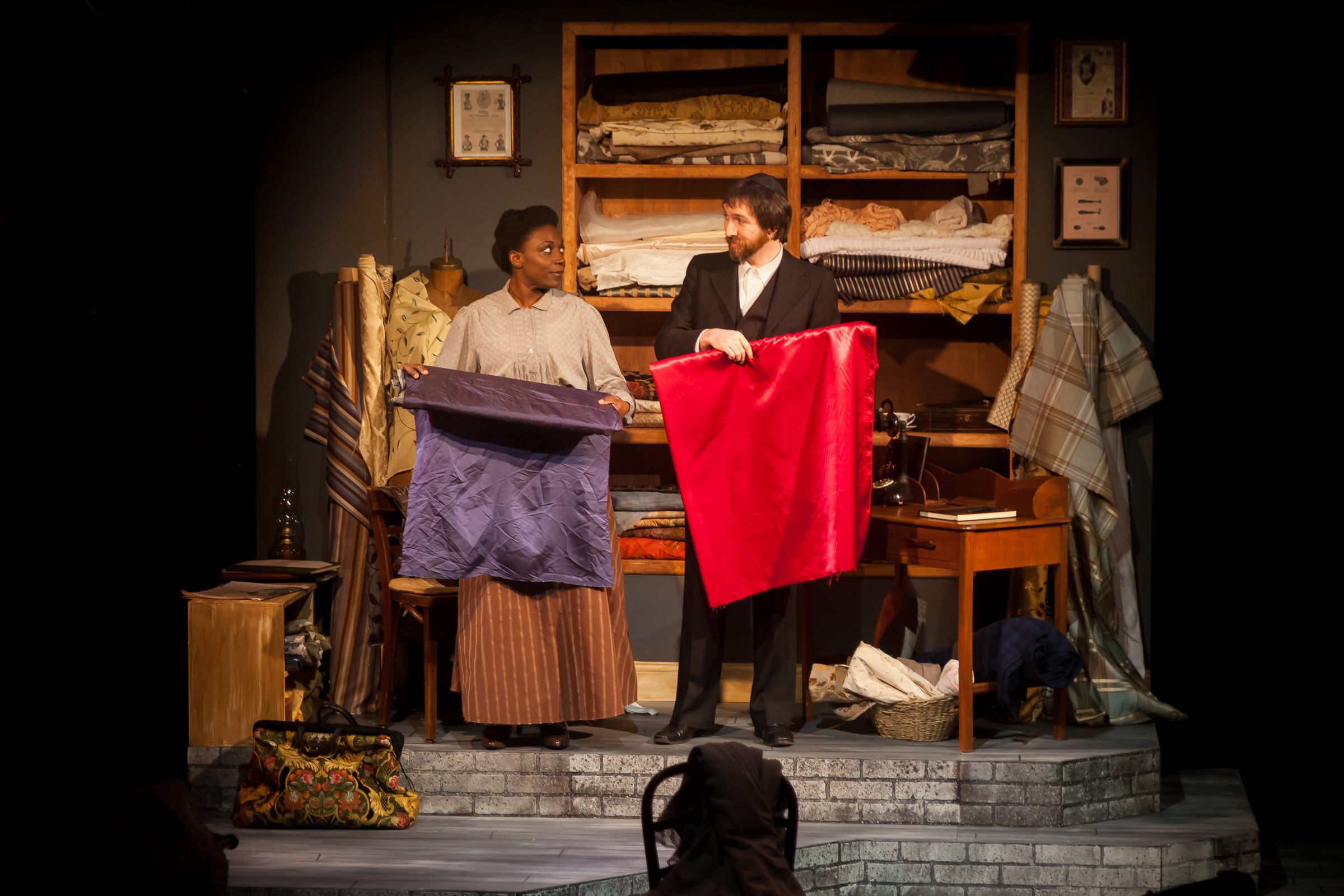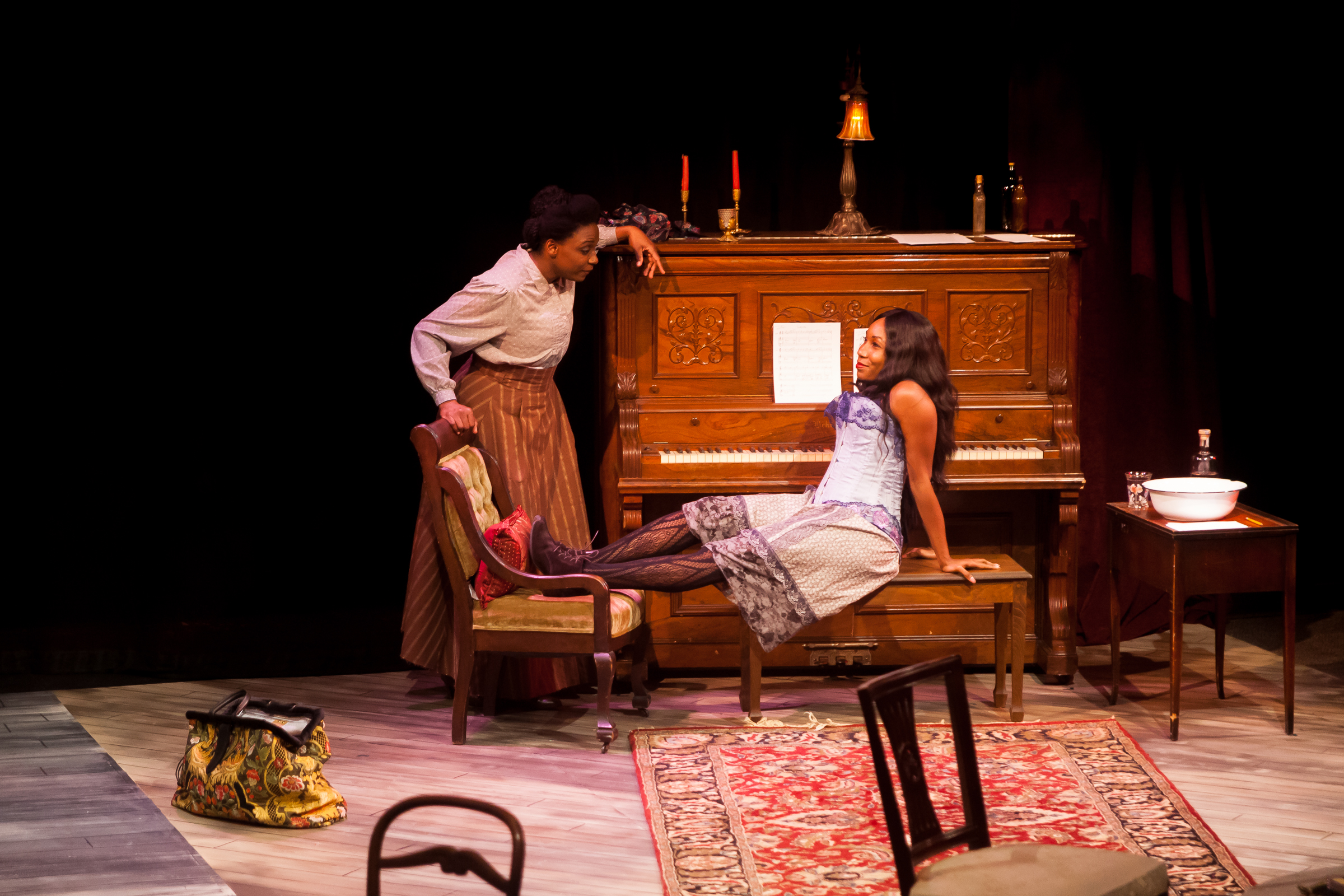Review of Mlima’s Tale, Westport Country Playhouse
The best thing to say about Lynn Nottage’s Mlima’s Tale, at Westport Country Playhouse through October 19 directed by Mark Lamos, is that it’s well intentioned. A polemic against the cruel and devastating slaughter of elephants in order to harvest their tusks for the ivory trade, the play is less a satisfying night of theater than a protracted glimpse behind the scenes in the illegal market for ivory. The play is based on an article, “The Ivory Highway” by Damon Tabor, and the show feels like a dogged effort to amplify nonfiction with theatrical touches, most of which lack any particular bite—whether of satire or sentiment.
Mlima (Jermaine Rowe) in Westport Country Playhouse’s production of Mlima’s Tale, directed by Mark Lamos (Photos by Carol Rosegg)
The gripping and memorable opening introduces us to the elephant, Mlima, an “old tusker” (indicating the age and size of his tusks) played with riveting presence by Jermaine Rowe, who speaks of his time-won integration into his environment, one that used to be free of “the acrid stench of men.” Now, though he lives on a protected reserve, he is a prime target for poachers. The brutal death of Mlima ends the first scene and is the last dramatic event to occur in this 90 minute display of short scenes, all comprised of dialogues between two characters, all complicit in the illegal trade for poor Mlima’s much valued tusks.
Most of the scenes play like dialogues of exposition in B-movies, an association that comes to mind because the three actors—Adit Dileep, Jennean Farmer, and Carl Hendrick Louis—affect a variety of accents that are at times more attention-drawing than smoothly natural. Rather than making the scenes feel more real, the effect is to make us aware of how staged it all is, an effect that might be used to create a certain satiric point—about how differences (of ethnicity, nationality, class status) are rather secondary to shared greed, perhaps—but that doesn’t seem the intention. In any case, the dialogue, as delivered, does little to open to us the worlds these people—a poacher, a game warden, a government official, a ship captain, a smuggler, a collector of objets d’art, and a master ivory carver, among others—actually inhabit. We may reflect on Hannah Arendt’s oft-cited line about the “banality of evil,” but scene after scene making the same point—for lack of any other—is dull indeed. And “evil” as such is remote as well. What we see instead is the ingenuity by which humans are able to capitalize on whatever or whomever invites exploitation while lacking in sufficient protection.
Mlima (Jermaine Rowe), Poacher (Jennean Farmer), Official (Carl Hendrick Louis)
The further we get from the act of poaching that resulted in Mlima’s death, the more static the scenes become. Early on, the dialogue between the poacher (Farmer) and a corrupt official (Louis) might create the sense that we’re going to see how the killing of Mlima plays out within Kenya. But that would require staying with one or another set of characters. Instead, Nottage’s conceit is—as Mark Lamos points out in his introductory notes “From the Artistic Director”—to employ Arthur Schnitzler’s technique, in La Ronde, of presenting a series of scenes in which a character introduced in one scene—here, the poacher, for instance—is present in the next scene with a new character, who then has a scene with a new character, who then is in the subsequent scene, and so on. Throughout, Mlima appears as a baleful presence who, as a scene ends, walks up to the newly introduced character and smears them with the white paint which adorns his own body.
A customs officer (Carl Hendrick Louis), a ship captain (Adit Dileep), seated; Mlima (Jermaine Rowe), standing
The set is mainly decorated by Yana Birykova’s projections, which include graphic photos of violence enacted upon an elephant carcass as well as sayings and titles that create a kind of folkloric subtext to the events, as if the drama were going to become a morality tale of sorts. Not all of the text can be seen from all seats, but it doesn’t matter much. Indeed, much of the tech is simply window-dressing, at times—as in a photo of a shop full of Chinese lanterns—distractions more than evocations.
Arguably, the play might do more than an article in a magazine can to get a rise of moral indignation from an audience. And yet the detachment we feel toward these characters only underlines how—once the breath has left Mlima’s body—what becomes of his tusks is immaterial, even if their material—ivory—is the whole point of their market interest. The park warden (Dileep) vows to keep the tusks in Kenya to honor Mlima but that is easier said than done. After that, it’s merely a case of what interest we find in how the tusks get to the carver and then to a collector. Once upon a time, such a play might’ve ended with the ivory gracing the keyboard of a piano upon which a musical genius attained to glory, but we can be said to be safely past those days.
The tragedy of the fate of such great elephants as Mlima is real. Mlima’s Tale, however, feels rather less than tragic. It’s depressing and infuriating, made more so by this uninspiring production.
Mlima’s Tale
By Lynn Nottage
Directed by Mark Lamos
Scenic Design: Claire DeLiso; Costume Design: Fabian Fidel Aguilar; Lighting Design: Isabella Byrd; Composer: Michael Keck; Projection: Yana Birykova; Choreographer: Jeffrey Page; Fight Director/Intimacy Coach: Michael Rossmy; Props Supervisor: Samantha Shoffner; Dialect Coach: Julie Foh; Dramaturg: Liam Lonegan; Production Stage Manager: Chris De Camillis
Cast: Adit Dileep, Jennean Farmer, Carl Hendrick Louis, Jermaine Rowe
Westport Country Playhouse
October 1-19, 2019






